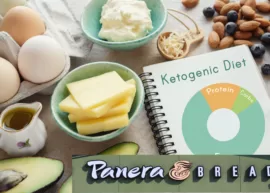Milk can be an excellent source of protein, depending on the source. While mammal milk tends to be high in protein, some plant-based milk is lacking in the protein department.
Coconut milk and rice milk have the least protein of all the types of milk with 0 grams per cup.
We’ll review these and eight other low-protein milks in this article!

Protein in milk
As mentioned earlier, mammal-based milk like cow, sheep, and goat milk tends to be rich in protein. Plant-based milk can be lower in protein in comparison – but there are plenty of protein-rich plant milks out there, too.
Some plant-based milk is made by blending nuts or seeds with water and then straining the solids out, which doesn’t leave much protein behind, even though nuts and seeds are generally high in protein!
We’ll review ten types of milk with two grams or fewer of protein per cup (for comparison, cow milk has around 8 grams of protein per cup).
10 low-protein milks
(Protein listed for each milk is per cup/8 oz/237 ml.)
Coconut milk – 0 grams
Coconut milk is a great keto- and Paleo-friendly milk alternative, but it doesn’t contain any protein. Coconut milk is higher in fat than other macronutrients (carbs and protein), which is a plus for keto.
So how is coconut milk made, anyway?
Carton coconut milk (the drinkable kind – not the high-fat canned coconut milk) is made by blending high-fat coconut milk or coconut cream (a fattier version of canned coconut milk) with water.
Rice milk – 0 grams
Rice (especially white rice) isn’t a high-protein grain, so it’s not too surprising that rice milk isn’t high in protein. What does rice milk have going for it, though? It’s a great allergen-friendly milk free of cow’s milk protein, tree nuts, peanuts, soy, and sesame, which are all major allergens.
Almond-coconut milk – 1 gram
Almond-coconut milk is a blend of almond and coconut milk, which are both low in protein on their own.
Many people like almond-coconut milk because it offers a subtle coconut flavor with all of the benefits of almond milk (slightly nutty flavor, can be thicker than plain coconut milk, etc.)
Almond milk – 1 gram
Almond milk is one of the most popular dairy-free milk alternatives on the market. Even though almonds are high in protein, almond milk is not high in protein since the majority of the nuts are strained from the liquid during the process of making almond milk.
Banana milk – 1 gram
Fruit isn’t rich in protein, so bananas and banana milk aren’t, either.
What is banana milk, you might be asking? Referred to as “bananamilk” by its main manufacturer (Mooala), bananamilk is made by blending bananas, sunflower seeds, and cinnamon (with a thickener added).
Since sesame seeds are added, banana milk isn’t suitable for those with a sesame allergy.
Macadamia milk – 1 gram
Macadamia milk is similar to other nut- and seed milks in terms of benefits. It’s low in carbs, gluten-free, dairy-free, and fortified with vitamin D and calcium, which is especially beneficial for vegans.
Oat milk – 1 gram
Oat milk is growing in popularity, but it’s not because of its protein content. Oat milk is low in calories but is higher in carbs than some plant-based milk.
Hazelnut milk – 2 grams
Hazelnut milk is vegan, Paleo, and keto-friendly, but it’s not a great source of protein. It is higher in fat, which is good for keto!
Pistachio milk – 2 grams
This Paleo-friendly milk isn’t super easy to find, but if you make your own without a sweetener (or a keto-friendly sweetener) it could be keto-friendly, too!
Sunflower seed milk – 2 grams
This milk alternative is another good one if you have allergies since it’s nut-free!
Nutrition comparison of low-protein milk
| Per cup (237 ml/8 oz.) | Calories | Total fat (saturated) | Total carbs | Total sugars (incl. added) | Protein |
| Coconut milk | 40 | 4 g (3.5 g) | 2 g | <1 g (0 g) | 0 g |
| Rice milk | 70 | 2.5 g (0 g) | 13 g | <1 g (0 g) | 0 g |
| Almond-coconut milk | 40 | 3.5 g (1 g) | 1 g | 0 g | 1 g |
| Almond milk | 30 | 2.5 g (0 g) | 1 g | 0 g | 1 g |
| Banana milk | 60 | 3 g (0 g) | 9 g | 4 g (0 g) | 1 g |
| Macadamia milk | 50 | 5 g (1 g) | 1 g | 0 g | 1 g |
| Oat milk | 45 | 0.5 g (0 g) | 8 g | 0 g | 1 g |
| Hazelnut milk | 90 | 9 g (0.5 g) | 1 g | 1 g (0 g) | 2 g |
| Pistachio milk | 80 | 3.5 g (0 g) | 9 g | 7 g (6 g) | 2 g |
| Sunflower seed milk | 50 | 4.5 g (0 g) | 2 g | 0 g | 2 g |
FAQs:
Sheep milk is very high in protein with 15 grams per cup. It’s not typically drunk on its own because it’s so high in fat, but is instead used to make cheese and yogurt.
2% milk has the same amount of protein as whole milk (8 grams per cup). The only difference between the two is the fat content.
Almond milk is low in protein with 1 gram per cup.





Leave a Comment